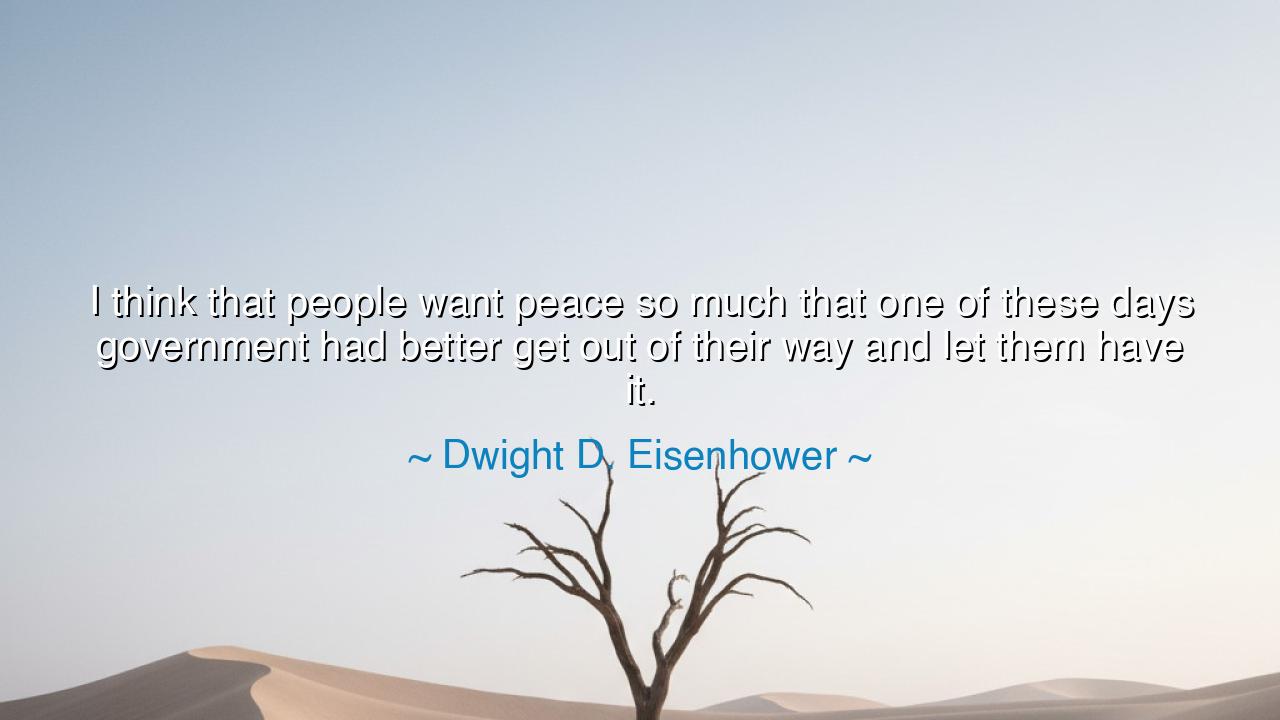
I think that people want peace so much that one of these days
I think that people want peace so much that one of these days government had better get out of their way and let them have it.






"I think that people want peace so much that one of these days government had better get out of their way and let them have it." Thus spoke Dwight D. Eisenhower, soldier, general, and president — a man who had seen the full cost of war and the quiet yearning of humanity for peace. His words, uttered not as a naïve hope but as the tempered wisdom of one who had walked through the fire of battle, carry the weight of history and the light of revelation. In them burns the eternal truth: that peace is not something granted by governments, but something born in the hearts of the people — a force as unstoppable as life itself, and one that even power must one day yield to.
Eisenhower, the Supreme Commander of the Allied Forces during the Second World War, had watched cities burn, soldiers fall, and nations mourn. He had seen how governments, driven by fear, ambition, and pride, too often sow the seeds of destruction while claiming to defend civilization. Yet he also knew that beneath the banners of politics and conquest lived ordinary people — farmers, mothers, workers, dreamers — who longed not for power, but for peace. When he spoke these words, it was not to flatter the masses, but to remind rulers that the true will of the people is not found in wars waged or treaties signed, but in the desire for peace that endures even in the darkest of times.
The meaning of his words cuts deep into the heart of human history. From the dawn of civilization, rulers have claimed to act in the name of security, glory, or destiny. They have raised armies and built empires, often believing — or pretending — that the people demanded it. Yet time and again, when the drums of war have fallen silent, the people themselves have shown what they truly desired: to rebuild, to heal, to live. Eisenhower saw this truth not as a politician but as a warrior who had learned that no victory in battle can compare to the quiet triumph of peace. He understood that when the will for peace becomes stronger than the fear of oppression, it will move like a tide no government can resist.
History offers many mirrors to this truth. When the Berlin Wall fell in 1989, it was not the might of armies that brought it down, but the steady courage of the people. For decades, governments on both sides of the divide had fortified borders, armed themselves with nuclear fire, and claimed to defend freedom through domination. Yet, in the end, it was not missiles or generals that triumphed, but citizens — mothers crossing checkpoints, workers striking for liberty, students chanting for unity. The will of the people rose like the dawn, and even the cold machinery of power could not hold it back. As Eisenhower foretold, when humanity’s longing for peace becomes unstoppable, government must step aside and let the people have it.
And yet, Eisenhower’s words are not merely about politics or war — they are about the human condition. For within every heart lies a battle between fear and compassion, between anger and understanding. The governments of the world are but reflections of their peoples, and peace will only reign in the world when it first reigns in the soul. Eisenhower believed that if ordinary men and women could reject hatred, if they could see in their neighbors — even their enemies — a shared humanity, then peace would no longer be a dream deferred. It would be a living truth, rising from the soil of conscience rather than decreed from the throne of power.
The wisdom of his statement also contains a subtle warning. When rulers seek to perpetuate conflict for power or profit, when they speak of endless enemies and justify endless war, they act not as guardians but as barriers to peace. Yet when the people awaken — when they tire of bloodshed, when they see that humanity’s true enemy is not one another but fear itself — then the rulers will have no choice but to follow. The will of the people, united in the pursuit of peace, is stronger than any government or army. It is a revolution of the spirit, and it cannot be crushed.
The lesson is clear and eternal: peace is not a gift to be granted; it is a right to be claimed. Do not wait for leaders to deliver it — create it in your homes, your communities, your hearts. Refuse to feed the flames of hatred with words or actions. Live as builders, not destroyers; as healers, not conquerors. When enough people live by this truth, the structures of power that thrive on division will crumble from within. Peace, then, will not be imposed — it will be inevitable.
So remember the wisdom of Dwight D. Eisenhower, the warrior who learned that the greatest victory is not won on the battlefield but in the heart: that when the people’s longing for peace becomes stronger than their fear of authority, no force on earth can stand in their way. Let every generation rise to this calling — to make peace not a policy, but a principle; not a dream, but a daily act of courage. For when the spirit of peace awakens in humanity, even government itself must step aside, and the world will, at last, breathe free.






AAdministratorAdministrator
Welcome, honored guests. Please leave a comment, we will respond soon